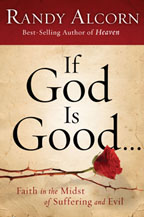The following is the introduction to Randy Alcorn’s book, If God Is Good ... Faith in the Midst of Suffering and Evil.
I came to know my friend Jim Harrell after he read my book Heaven. We talked on the phone, exchanged e-mails, and quickly connected at a heart level. Jim, a successful businessman, strong and athletic for most of his life, told me he really looked forward to reading If God Is Good. He asked me for the first draft, which I happily sent him.
Jim contracted ALS, Lou Gehrig’s disease, in 2003. Yet Jim has called the last six years of his life the most significant. While his body deteriorated and he lost normal functions, one after another, Jim touched more people (and was touched more by God) than at any other time of his life.
While writing, I drew on Jim’s wisdom, as well as that of many other sufferers.
During the two years it has taken me to research and write this book, many people have asked about the project. I expected that my answer, containing the words evil and suffering, would prompt a quick change of subject. Most, however, expressed keen interest and asked penetrating questions. Several launched into their own stories, as if having received permission to uncork the bottle.
What, after all, is more universal to human experience than suffering? And what is more important than the perspective we bring to it?
How we answer the central question of If God Is Good will radically affect how we see God and the world around us.
We may want to turn away from world suffering and refuse to reflect on the significance of our own pain; we just want it to go away. But despite the superficiality of our culture, we remain God’s image-bearers—thinking and caring people, wired to ask questions and seek answers.
No question looms larger than the central question of this book: If God is good…why all this evil and suffering? If God loves us, how can he justify allowing (or sending) the sometimes overwhelming difficulties we face?
Does this great question interest you? If so, I invite you to join me on a journey of discovery.
While traveling this long road, I found something surprising: the journey was not only rewarding, but fascinating, enlightening, and at times downright enjoyable. I know it sounds counterintuitive—shouldn’t it depress someone to meditate on evil and suffering? In fact, I’d already seen enough evil and suffering to feel deeply troubled. What I needed was perspective. Instead of being disheartened, I’m encouraged.
In this process, I’ve taken the most pleasure in focusing on God, exploring his attributes of goodness, love, holiness, justice, patience, grace, and mercy. While my journey hasn’t unearthed easy answers, I’m astonished at how much insight Scripture offers.
Seeking answers to this question should turn us toward Jesus in a fresh way.
In looking for answers, I’ve beheld a God who says, “I have indeed seen the misery of my people in Egypt. I have heard them crying out because of their slave drivers, and I am concerned about their suffering” (Exodus 3:7). I’ve found great comfort in hearing God speak of a time when he could bear his people’s misery no longer (see Judges 10:16). I revel in God’s emphatic promise that he will make a New Earth where he will come down to live with us, and on which “he will wipe every tear from their eyes. There will be no more death or mourning or crying or pain” (Revelation 21:4). Above all, in this process, I’ve seen Jesus.
The first physician to die of the AIDS virus in the United Kingdom was a young Christian. He contracted the disease while conducting medical research in Zimbabwe. In the last days of his life he struggled to express himself to his wife. Near the end, he couldn’t talk, and had only enough strength to write the letter J. She ran through her mental dictionary, saying various words beginning with J. None was right. Finally she said, “Jesus?”
He nodded. Yes, Jesus.
Jesus filled his thoughts. That’s all he wanted to say. That’s all his wife needed to hear.
In my research and writing, my thoughts too kept coming back to Jesus. What better place?
Often God has wiped away my own tears as I’ve contemplated potentially faith-jarring situations. I’ve been left not in despair, but with great hope that defies description and a peace that transcends understanding (see Philippians 4:7).
This journey has stretched my trust in God and his purposes, and I have emerged better prepared to face suffering and help others because of it. I feel I have much more to offer believers in Christ who may be questioning their faith, as well as unbelievers who consider the problem of evil and suffering their single greatest obstacle to faith.
If you stay with this book until the end, I feel certain you’ll be better for it. I believe God will reward you, as he has me, not only with much-needed perspective, but with deep-rooted peace and joy, and renewed perseverance.
We each bring our own burdens on the journey.
If abuse, rape, desertion, paralysis, debilitating disease, or the loss of a loved one has devastated you, then this issue isn’t theoretical, philosophical, or theological. It’s deeply personal. Logical arguments won’t satisfy you; in fact, they might offend you. You need help with the emotional problem of evil, not merely the logical problem of evil.
Though I write personally, from the heart, and tell stories of great courage and perspective, I must also present a case from Scripture and appeal to logic. But remember this: you are a whole person, and the path to your heart travels through your mind. Truth matters. To touch us at the heart level—and to keep touching us over days, months, years, and decades—truth must work its way into our minds.
By all means, speak with a friend and perhaps a pastor or counselor. But in the process don’t seek comfort by ignoring truth. When you try to soothe your feelings without bothering to think deeply about ideas, you are asking to be manipulated. Quick-fix feelings won’t sustain you over the long haul. On the other hand, deeply rooted beliefs—specifically a worldview grounded in Scripture—will allow you to persevere and hold on to a faith built on the rock of God’s truth.
In writing his magnificent story of redemption, God has revealed truths about himself, us, the world, goodness, evil, suffering, Heaven, and Hell. Those truths God reveals to us teem with life. The blood of man and God flows through them. God speaks with passion, not indifference; he utters fascinating words, not dull ones. To come to grips with the problem of evil and suffering, you must do more than hear heart-wrenching stories about suffering people. You must hear God’s truth to help you interpret those stories.
Maybe you’re holding on to years of bitterness and depression. You blame someone for your suffering—and that someone may be God. You will not find relief unless you gain perspective.
Or perhaps you fear that any attempt to “gain perspective” will deny or minimize your suffering, or that of others. I promise you, the Bible doesn’t minimize suffering or gloss over it, and neither will I.
At times, each of us must snuggle into our Father’s arms, like children, and there receive the comfort we need. Joni Eareckson Tada and Steve Estes write,
God, like a father, doesn’t just give advice. He gives himself. He becomes the husband to the grieving widow (Isaiah 54:5). He becomes the comforter to the barren woman (Isaiah 54:1). He becomes the father of the orphaned (Psalm 10:14). He becomes the bridegroom to the single person (Isaiah 62:5). He is the healer to the sick (Exodus 15:26). He is the wonderful counselor to the confused and depressed (Isaiah 9:6).
The faith that can’t be shaken is the faith that has been shaken.
God tells us that trials in which evil and suffering come upon us “have come so that your faith—of greater worth than gold, which perishes even though refined by fire—may be proved genuine and may result in praise, glory and honor when Jesus Christ is revealed” (1 Peter 1:7).
Alice Gray writes of sitting at a restaurant, talking with a friend about painful challenges in their lives. They frequently mentioned the Lord.
Alice noticed a young woman at the next table with a radiant, joyful face. The young woman smiled and said she’d overheard their conversation. Speaking softly, she encouraged Alice and Marlene that God understood and cared about their heartaches, and nothing could separate them from God’s love.
Alice continued talking with Marlene but realized something was different. The young woman’s words had refreshed them. When the smiling woman got up to leave, Alice noticed she wore bulky shoes, carried a walking stick, and moved with a severe limp.
The waitress told Alice this woman had been in a near-fatal automobile accident the year before. She’d been in and out of the hospital and rehabilitation. Her husband divorced her, their home had been sold, and she’d just moved into her own apartment. She used public transportation because she couldn’t drive. She’d been unable to find a job.
Alice sat stunned. She says, “This young woman’s conversation had been filled with delights of the Lord. There had been no weariness about her. She had encouraged us with words of praise and promise. Meeting her that day, we never would have suspected that storms were raging in her life. Even as she stepped outside into the cold winter wind, she seemed to carry God’s warm shelter of hope with her.”
God’s Word is central to gaining an eternal perspective.
In times of crisis we try to make sense of life. We crave perspective for our minds and relief for our hearts. We need our worldview realigned by God’s inspired Word: “All Scripture is God-breathed and is useful for teaching, rebuking, correcting and training in righteousness” (2 Timothy 3:16).
I quote Scripture frequently because God promises that his Word “will not return to me empty, but will accomplish what I desire and achieve the purpose for which I sent it” (Isaiah 55:11). God never makes such a promise about my words or your words. I want this book to accomplish God’s purpose—and that will happen only if it remains faithful to his words.
 The book won’t work magic or make your problems disappear. But I hope God will use it to help you, regardless of the difficulties you face. He offers us profound, moving, and surprising insights that can feed our minds, warm our hearts, and give us the strength to face a world that is not what it once was, or what it one day will be. I pray that readers of If God Is Good will not only find help for themselves, but life-changing insights to share with others—believers and unbelievers, family and friends and neighbors and co-workers—in their time of greatest need.
The book won’t work magic or make your problems disappear. But I hope God will use it to help you, regardless of the difficulties you face. He offers us profound, moving, and surprising insights that can feed our minds, warm our hearts, and give us the strength to face a world that is not what it once was, or what it one day will be. I pray that readers of If God Is Good will not only find help for themselves, but life-changing insights to share with others—believers and unbelievers, family and friends and neighbors and co-workers—in their time of greatest need.
Note from EPM: Randy’s new book If God Is Good is now available for purchase online, in local bookstores, and from the Eternal Perspective Ministries website. (Check out the If God Is Good Chapter Summaries for a preview of the book’s content.)
Photo by Richard Greif on Unsplash



